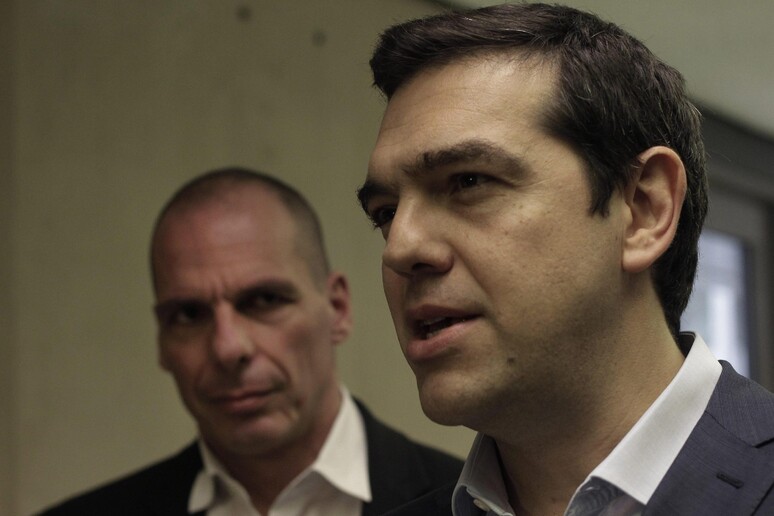Europe was holding its breath
Friday over Sunday's Greek referendum on current bailout terms
with the knock-on effects from a possible Grexit yet to be fully
determined.
As European Commission chief Jean-Claude Juncker dismissed
Athens' claim of of a quick deal if the No vote prevails,
Premier Alexis Tsipras urged his countryfolk to reject
"scaremongering" and vote No to strengthen Athens' hand in
future talks.
And the the European Financial Stability Facility (EFSF)
said Greece's missing a payment to the International Monetary
Fund is a "default event" that has been notified to the EFSF but
its board of governors has decided to wait and "not to ask"
Athens for "immediate payment of the loans allocated nor to use
its right to act," that is to say not to use any of the options
at its disposal.
Juncker said Greece's position would be "dramatically
weakened" if the nation votes No.
But he also stressed that negotiations will be tough even
if the Yes vote prevails.
"If the Greeks vote 'no', the Greek position will be
dramatically weakened," Juncker told a press conference.
"The (rescue) programme has come to an end, there are no
negotiations under way, if the Greeks will vote no, they have
done everything but strengthening the Greek negotiation
position.
"Even in the case of a 'yes' vote, we'll have difficult
negotiations".
Tsipras urged Greeks not to succumb to "blackmail" from
international pressure on the country, which missed a 1.6
billion euro IMF repayment earlier this week, triggering a
formal procedure for default.
In a short TV address, the leftist anti-austerity premier
insisted Greece's presence in the EU was not at stake.
Rejecting arguments from lenders and many EU partners,
Tsipras urged voters to ignore the "sirens of scaremongering".
Tsipras said a No vote would strengthen Greece's hand in
future debt negotiations.
He added that the vote would not determine whether Athens
stays in the eurozone or not.
He argued that the only way to make Greece's finances
sustainable was a 30% debt cut and a 20-year grace period for
repayment.
Tsipras said the IMF's latest report "justifies our choice
not to accept a deal that ignores the fundamental issue of the
debt".
Greek Finance Minister Yanis Varoufakis said a deal with
the country's creditors will be signed even if the nation votes
no to their proposals.
"An agreement is within sight," Bloomberg quoted Varoufakis
as telling an Irish radio station.
"It's more or less done".
Amid Tsipras' campaign for a No vote, Varoufakis has said
he will quit if Yes prevails.
Eurogroup officials on Thursday dismissed Greek hopes of
getting a "friendlier" bailout offer if voters reject the
creditors' offer in Sunday's referendum.
Nevertheless, Varoufakis said Friday that he is confident
that Greece "will stay in the euro", adding that a new agreement
will feature "restructuring of the debt".
A spokesperson for German Chancellor Angela Merkel said
the "door remains open" to Greece, but reiterated that it was
necessary to wait for the referendum before making further
moves.
The spokesman also stressed that "many steps" would be
needed in any further bailout talks, rebutting Tsipras's
assertion that a deal would be reached within 48 hours of an
eventual No vote.
"The negotiations involve the ESM (European Stability
Mechanism) and feature many steps," the spokesperson said.
The referendum currently looks too close to call, opinion
polls on Friday said - though three quarters of Greeks want to
stay in the euro.
Meanwhile the Treasury said an estimate of a Grexit cost
to Italy, published by a top ratings agency Thursday, was
probably too high.
Treasury Director General Maria Cannata said she had
doubts about Standard & Poor's estimate that an eventual Greek
exit from the eurozone could cost Italy an extra 11 billion
euros in debt servicing due to higher interest rates.
"It's a very aggressive forecast and it's not possible to
understand how it was made," she said.
In Greece, as pensioners queued to take out a maximum 120
euros, food and medicine began to get scarce on many islands and
there were fears for the tourism industry with bookings down
30-40%.
Greek industrialists urged their compatriots to vote Yes,
saying Greece could become "the new Argentina".
The Italian economy is continuing to recover but "the
unknowns linked to developments in the Greek crisis are weighing
on the macroeconomic picture", Istat said Friday.
Italian House Speaker Laura Boldrini said the
"prescription" the Troika has applied to its Greek patient since
2010 "has not worked".
It has "hit the Greek people hard and evidently has not
produced the desired results", Boldrini said.
She said "if the patient continues to be ill, and in fact
gets worse and worse, it means that the prescription has not
worked".
The ECB is set to take account of treaty article 5's
principle of proportionality urging a prudent approach in
weighing Greek bank liquidity after Sunday's referendum, sources
said Friday.
In theory, in a worst-case scenario, the ECB could shut
off the 90-billion-euro Emergency Liquidity Assistance (ELA) but
that would trigger Greek bank failure.
It is much more likely that the central bank would cut ELA
by raising the discount on the value of Greek bonds used as
guarantees by the banks, the sources said.
Some 300 people wearing ski masks clashed with police late
Friday on the way into Syntagma Square in central Athens where a
rally in favour of a referendum Yes vote was about to take
place.
Police stopped the demonstrators using tear gas.
ALL RIGHTS RESERVED © Copyright ANSA











